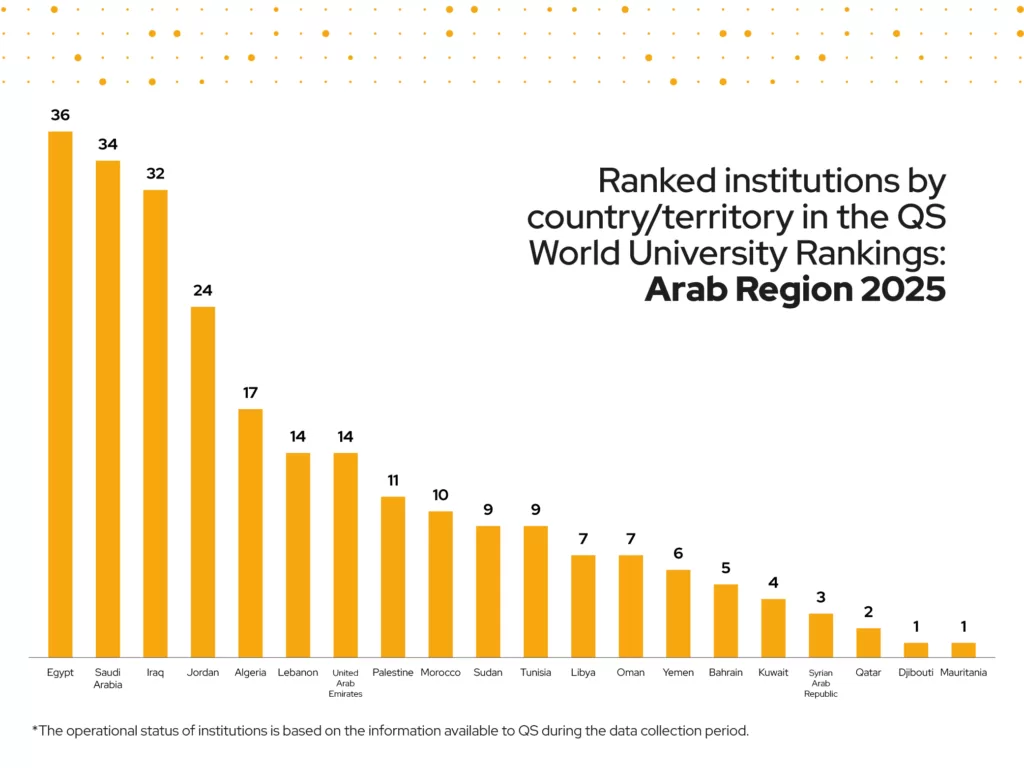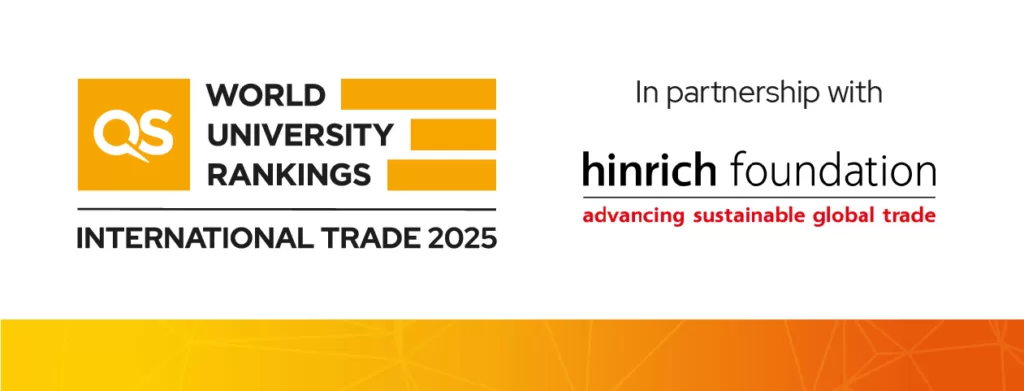
The QS World University Rankings: Arab Region 2025 are now live!
This year, there are 246 institutions ranked, evaluating institutions based on global recognition, research prowess, teaching resources and internationalisation across 20 countries in the Arab League, as well as in Africa and the Middle East.
King Fahd University of Petroleum & Minerals in Saudi Arabia is the top ranked university. They have excelled in various indicators such as Academic Reputation, Papers per Faculty and Faculty to Student. Qatar University moved up from third place to second, replacing King Saud University who is now third. Khalifa University of Science and Technology, and United Arab Emirates University both move into the top five, taking fourth and fifth place respectively.
Overall, universities based in Saudi Arabia and the UAE make up six of the top 10, and 13 of the top 20 in the QS World University Rankings: Arab Region 2025.
The top 10 leading institutions in the QS World University Rankings: Arab Region 2025
- King Fahd University of Petroleum & Minerals, Saudi Arabia
- Qatar University, Qatar
- King Saud University, Saudi Arabia
- Khalifa University of Science and Technology, United Arab Emirates
- United Arab Emirates University, United Arab Emirates
- American University of Beirut (AUB), Lebanon
- King Abdulaziz University (KAU), Saudi Arabia
- Sultan Qaboos University, Oman
- University of Jordan, Jordan
- American University of Sharjah, United Arab Emirates
There are nine indicators in this table which differ from the QS World University Rankings methodology:
Employer Reputation: Has a higher weighting (20%) than compared to its level in the QS World University Rankings (15%).
Citations per Paper: This metric is used instead of Citations per Faculty.
Papers per Faculty: This contributes to the Research and Discovery ratio.
International Research Network: This metric has a higher weighting in this table (10%) compared to the 5% weighting in the QS World University Rankings.
Faculty to Student ratio: This indicator has a higher weighting (15%) than the QS World University Rankings (10%).
International Student ratio: Has a lower weighting average.
International Faculty ratio: Has a lower weighting.
Staff with PhD: Some countries in the Arab region are actively working to enhance the research impact of their teaching staff. This indicator holds greater relevance here compared to the World University Rankings and serves as an additional Learning Experience indicator.
Web Impact: Assessed through the Global Engagement indicator, the Web Impact leverages data from The Webometrics Ranking Web of World Universities, a third-party source evaluating the reach of an institution’s online presence. This indicator allows us to identify regions that, while they may lack globally recognised brands, are making significant strides in building their reputation.
The top 20 of the QS World University Rankings: Arab Region 2025
King Khalid University (ranked 11th) in Saudi Arabia is the biggest climber within the top 20 overall, climbing 18 places, primarily based on improvements in Academic Reputation, Employer Reputation and Staff with PhD. The UAE’s Abu Dhabi University climbed 11 places to 12th, thanks to its improved performance in Academic Reputation, Employer Reputation and Faculty to Student Ratio.
Imam Abdulrahman Bin Faisal University (IAU) in Saudi Arabia also joined the top 20, moving to 14th place from 24th in the previous year. It improved their scores in Academic Reputation, Employer Reputation and Staff with PhD.
The American University in Cairo, the highest-ranking institution in Egypt and North Africa, is now positioned at 13th, having dropped two places from the previous edition.
New entrants
There are 25 newly ranked institutions in the QS World University Rankings: Arab Region 2025. Tishk International University and Al Furat Al Awsat Technical University are the only newly ranked universities to enter the top 150. Notably, Al Furat Al Awsat Technical University achieved the highest score in the Faculty to Student indicator among the new entrants. Iraq has the highest number of debutants with eight.
Country-level highlights

Egypt
Egypt has the most universities ranked, with 36 appearing. 14 are in the top 100 and seven are in the top 50 of the QS World University Rankings: Arab Region 2025. Within the top 50 most improved institutions overall is Egypt’s Al-Azhar University, which climbed from a banded position (51-60th) last year to 47th place. The main drivers of its improved performance are Employer Reputation and International Research Network.
Arab Academy for Science, Technology and Maritime Transport also saw notable improvement as they moved from a banded position (71-80th) to 59th, with its primary driver in International Research Network.
Saudi Arabia
Saudi Arabia has 34 ranked institutions. King Fahd University of Petroleum & Minerals is the top ranked institution for the country and the region overall. Within the top 50 of the QS World University Rankings: Arab Region 2025, King Khalid University is the most improved in the country as well as globally, moving up 18 places, with Imam Mohammed Ibn Saud Islamic University – IMSU and Qassim University also climbing significantly, and into the top 50.
United Arab Emirates
The UAE has 14 institutions in the Rankings with three in the top 10, six in the top 20 and 10 in the top 50 overall. The most improved institution in the UAE is Abu Dhabi University which climbed 11 places up from 23rd to now 12th overall.



